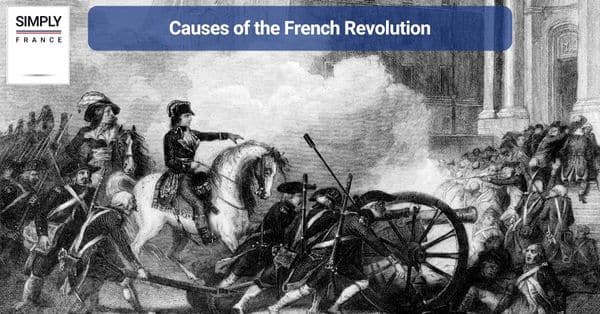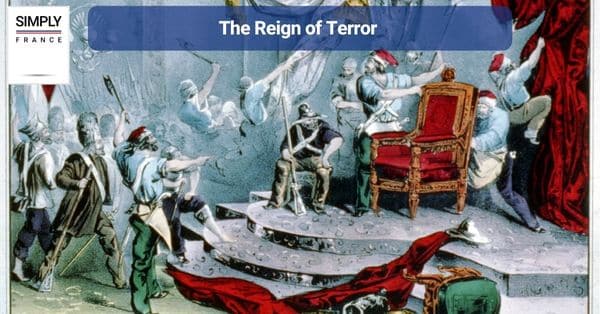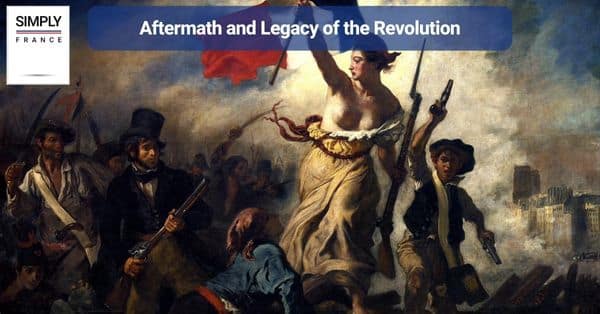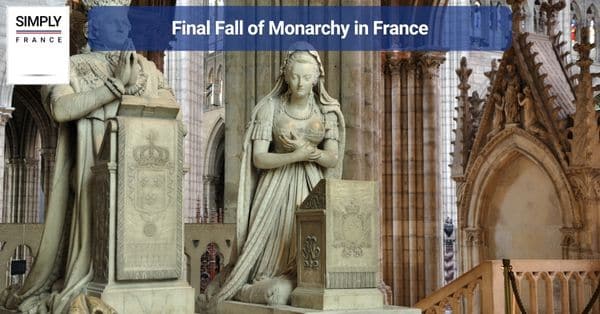The French Revolution, fueled by inequality and Enlightenment ideals, ended the monarchy in France. It started with the Bastille’s fall and the National Assembly’s formation. The Reign of Terror under Robespierre’s rule saw widespread repression, while political instability persisted until Napoleon Bonaparte’s rise and the establishment of the French Consulate.
This article will provide an overview of the causes, events, and aftermath of the French Revolution as well as discuss its legacy in establishing the final fall of the monarchy in France.
Causes of the French Revolution
The French Revolution was a watershed moment in European history, marking the end of the Bourbon monarchy and the birth of the First French Republic. The Revolution was sparked by a complex web of political, economic, and social factors that had been simmering beneath the surface of French society for years.
Political Causes
One of the primary political causes of the French Revolution was a crisis of legitimacy within the Bourbon monarchy. The kings of France had long claimed to rule by divine right, but this idea had been challenged by Enlightenment thinkers who argued that power should derive from the consent of the governed. The monarchy’s attempts to suppress these ideas led to growing resentment among the educated classes and set the stage for future conflict.
Economic Causes
The French economy was in a state of crisis in the years leading up to the Revolution. The country was burdened by heavy taxes, a complex system of tariffs and regulations, and a corrupt financial system that favored wealthy elites. Meanwhile, a series of poor harvests and a rising population led to food shortages and skyrocketing prices, further fueling discontent among the masses.
Social Causes
Finally, the French Revolution was driven by deep-seated social inequalities. The country was divided into three estates: the clergy, the nobility, and the commoners.
The first two estates enjoyed a range of privileges and exemptions while the third estate bore the burden of taxation and other obligations. This system created a stark divide between the haves and the have-nots and left many feeling resentful and powerless.

The Beginning of the Revolution
The beginning of the French Revolution marked a crucial turning point in France’s history. It commenced with the convening of the Estates-General, a representative assembly, in May 1789. However, the delegates from the Third Estate, representing the common people, grew frustrated with the unequal representation and broke away, forming the National Assembly.
On July 14, 1789, the furious Parisian populace stormed the Bastille, a symbol of royal authority, and seized control, unleashing a wave of popular uprisings across the country. Following the fall of the Bastille, the National Assembly continued its revolutionary agenda. In August 1789, it abolished feudalism and adopted the Declaration of the Rights of Man and of the Citizen, proclaiming liberty, equality, and fraternity.
The revolutionary spirit spread rapidly, leading to the Women’s March on Versailles in October. Where thousands of angry women demanded bread and forced King Louis XVI and the royal family to relocate to Paris. These early events set the stage for further radicalization and the transformation of the French Revolution into a profound upheaval that would reshape the political and social landscape of France.

The Reign of Terror
The Reign of Terror, spanning from 1793 to 1794 during the French Revolution, was a period of brutal repression and mass executions. Led by Maximilien Robespierre and the Committee of Public Safety, it aimed to protect the revolution from counter-revolutionaries. Resulting in the establishment of revolutionary courts and the infamous use of the guillotine.
Thousands of individuals, including aristocrats, clergy, and political opponents, were executed, instilling fear and paving the way for a new moral order. The reign ended with Robespierre’s fall, leading to a shift in power and the eventual stabilization of the revolution.

Aftermath and Legacy of the Revolution
The French Revolution was one of the most significant events in European history. It marked the end of monarchy in France and the rise of democracy.
The revolution lasted from 1789 to 1799 and had far-reaching effects not only on France but also on the rest of Europe. The aftermath and legacy of the revolution are still felt today in many ways.
Political Changes
The French Revolution brought about significant political changes in France. The absolute monarchy was abolished, and a constitutional monarchy was established.
The National Assembly, which had been formed during the revolution. Created a new constitution that granted more rights to the people. The revolution also led to the creation of the First Republic of France in 1792, which marked the end of the monarchy.
Economic Changes
The revolution brought about significant economic changes in France. The feudal system was abolished, and the lands owned by the nobility were confiscated and redistributed to the peasants.
This led to the emergence of a new middle class and a more egalitarian society. The revolution also led to the introduction of new economic policies, such as the nationalization of industries and the establishment of a centralized banking system.
Social Changes
The French Revolution had a significant impact on French society. The revolution brought about the end of the old aristocracy and the emergence of a new social order. The revolution also led to the abolition of slavery in French colonies, making France the first European country to do so.
Spread of Revolutionary Ideas
The French Revolution inspired other countries to fight for their own freedom and democracy. The ideals of liberty, equality, and fraternity spread throughout Europe and beyond, leading to the emergence of new democratic movements. The revolution also inspired the Haitian Revolution, which led to the establishment of the first black-led republic.
Rise of Nationalism
The French Revolution gave rise to nationalism, the idea that people who share a common language, culture, or history should have their own nation-state. This led to the formation of new nation-states in Europe, such as Italy and Germany.
New Forms of Art and Literature
The revolution inspired new forms of art and literature, such as romanticism and realism. These movements rejected the classical traditions of the past and focused on individualism, emotion, and nature.

Final Fall of Monarchy in France
The final fall of the monarchy in France occurred with the execution of King Louis XVI and Queen Marie Antoinette in 1793. The revolutionaries, driven by the ideals of the French Revolution, deemed the monarchy a symbol of oppression and inequality. The king’s trial and subsequent guillotine execution marked a significant shift in power and a definitive end to the monarchy.
Following the execution of Louis XVI, the First French Republic was established, ushering in a new era of governance. The republic aimed to dismantle the feudal system and establish a more egalitarian society.
This period saw the rise of political factions and conflicts, as different factions vied for power and influence. The ultimate consolidation of power came with the establishment of the French Consulate. Led by Napoleon Bonaparte, who would later become Emperor of the French, marking the end of the Bourbon monarchy and the beginning of a new chapter in French history.

In conclusion
The French Revolution was a watershed moment in European history, ushering in a new era of democracy and social change. It brought about the end of the monarchy in France and inspired similar revolts across Europe. Its legacy can still be felt today in the form of political, economic, and social reforms as well as new forms of literature and art.
The final fall of the monarchy in France was a consequence of the revolution, heralding the birth of the First French Republic and paving the way for future political stability. It is clear that the French Revolution had an immense impact on French society and its legacy will continue to be remembered for years to come.


